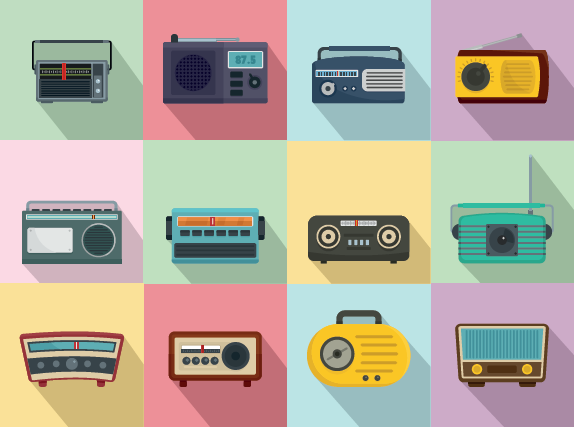EOTO: The Radio
The radio is something that we are all familiar with something that we have all grown accustomed to throughout our childhoods and into our adulthood and everyday lives. The radio has an extensive and interesting history and a long evolution bringing it all the way to portable radios, A.K.A mobile phones, that we know today.
History
The radio has a fascinating and deep history. Like many other great inventions, the actual creator is disputed. Some believe that it was Nikola Tesla during his 1893 demonstration of wireless radio signals in St. Louis, Missouri; however, despite this demonstration, it is Guglielmo Marconi that is most commonly attributed to the invention. It was also Marconi who was awarded the first English patent in 1896; however, just 4 years later, Tesla received an American patent for the same invention in 1900. Despite the issue with the patents, Marconi is most commonly recognized as the inventor thanks to his great feat of being the first person to send a radio signal across the Atlantic in 1901.
This revolutionary item was first popularized due to its use on naval ships during the First World War. In fact, it was only 1906 when inventor Reginald Fessenden improved upon Marconi's wireless transmission by giving a Christmas gift to some sailors off of New England. He read the story of Christmas from the Gospel of Luke while a violin played "Silent Night," between Morse code transmissions.
It was thanks to this feat that radios started to grow in popularity even more in the 1920s leading to KDKA becoming the first licensed radio station. They had their first transmission on November 2nd, 1920, election day. They broadcast the results of the Harding versus Cox election, announcing Harding as the winner. It was later, in 1923, that AT&T, the first Toll and Chain Broadcaster released their first radio advertisement. Companies like NBC and CBS were created to AT&T being the sole broadcasting station with rights to toll broadcasting.
Evolution
Evolution
The radio has evolved significantly from that first transition across the Atlantic to the portable radios in our pockets and in our cars. Since advancements like the first transmission across the Atlantic, the radio continued to developed, leading to new great feats such as the first live human voice being transmitted at the University of Wisconsin-Madison in 1919. It was also in the 1920s or the "Golden Age of Radio" that radios began to be sold commercially. They were geared more towards family and were used for music, news, and other forms of entertainment. Later in the 1950s, National News Stations were created, allowing for greater and more widespread information and connection. It was then in 1960 when radios began to be used in the Space Program, and as we all know, it was only 9 years after this development that our country landed a human on the moon.
Advantages

Radio, like other great communication advancements, has had a tremendously positive effect on society. One way to prove the effect radio has had is to look at its significant effects or use by prominent people. One such example is radio's use during the Great Depression by President Franklin Delano Roosevelt(FDR). From March 1933 to June 1944, FDR used his commonly known "fire-side chats" to calm the nation during this difficult time and also to provide support to and promote his New Deal Policies. Many people found that the fire-side chats did exactly as intended. They felt like they connected to their president and could rely on him.
Another advancement that most people in modern times would appreciate is the spread and popularization of many different genres of music. Many genres such as Jazz, Rock n' Roll, and country gained popularity. Previously Country was a regional sound that was only displayed in close, familiar settings and not typically heard by people, not in southern communities. Music became popular through the creation and increased use of AM and FM radio stations. Not only was the music itself made more popular, but thanks to "flaming youth" in the 20's using Jazz to rebel against society standards, African American culture was more widely accepted.
And finally, one last advantage that the radio provided to the world is the increased spread of knowledge and news. In the past, the spread of information was hindered by a lack of education and illiteracy. Newspapers, of course, were incredibly popular and useful, but for those that don't know how to read, they were at a loss for information. Newspapers also took time to produce, so by the time the paper was issued, the news could be old and over. The radio allowed for fast-paced information minutes after or even during the event itself.
Disadvantages

Too much of a good thing can be detrimental to oneself. This is the case for any great invention, and the radio is no exception. Despite all of the amazing advantages that come with the radio, there are still some significant disadvantages.
One disadvantage that actually only served to prove the power of the radio was the War Of The Worlds incident. 'War Of The Worlds" is a Sci-Fi Action novel written by H.G. Wells. In 1933 a radio station held a live reenactment broadcast of the book. Some listeners tuned in late and missed the disclaimer saying that this was indeed all fake and that there was nothing to worry about. Because of this, many believe that this was an actual news report claiming the earth was being taken over by Martians leading many to run to the streets armed and ready to protect their planet. Nowadays, we may see this a foolish and completely unbelievable, but during this time-space had not been explored, and the radio was meant to be a person's most trusted source of news, of course, you would believe what they are telling you. This leads us to our next disadvantage.
Our next disadvantage comes in the form of the Fairness Doctrine. The Fairness Doctrine of 1949 required any station broadcasting a political point of view over the air to allow equal time to all reasonable dissenting views. This means that if you were to give your opinion on something relevant to the nation, you also must allow time for your opposition. This provided for an equal playing field for all parties. This policy was disputed by radio stations under the First Amendment and abolished in 1987. Because that this was taken back, radio stations and any other online media can now be completely biased and not provide accurate or complete information to the public. Imagine if you live in a relatively rural area where you can only receive one radio station, and that station happened to be on the opposite side of your political views. You will not obtain the information that you desire. Our country just had a large and important presidential election. If biased views are all that are given to the people, how can we expect a fair and equal election of power?

Currently as I write this I am listening to music on my phone and if I wanted I could go to my car and listen to music there. Thsi just shows how the radio had been adapted into our everyday lives and how influential they can be. The radio had been through many changes and still remains relevant to our lives, I predict that the radio will not die out anytime soon in the foreseeable future.

No comments:
Post a Comment